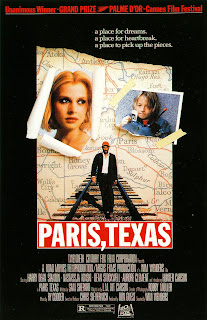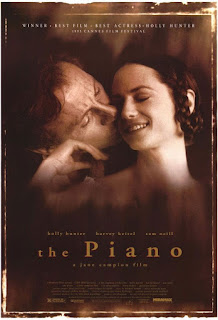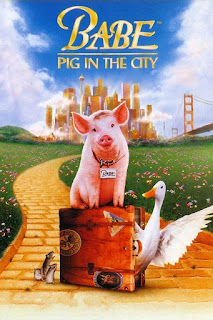July 11th: PARIS, TEXAS (Wim Wenders, 1984)
NOTE: This film will be projected in the high-definition Blu-ray format.
A man found wandering in the desert is reunited with his brother and son and slowly begins to reassemble his life.
Director Wim Wenders is a key member of the New German Cinema of the 1960s and 70s, alongside Werner Herzog and Rainer Werner Fassbinder. At university originally studying medicine and philosophy, he dropped out to become a painter, but soon fell under the spell of cinema and went to film school in Munich. His successful "Road Movie" trilogy led him to the fringes of Hollywood, working with legendary directors Nicholas Ray and Samuel Fuller, actor Dennis Hopper, and a troubled collaboration with Francis Ford Coppola's Zoetrope Studios on the neo-noir Hammett, where he met playwright and actor Sam Shepard.
Shepard and Wenders first planned to adapt the former's published autobiographical notebooks, Motel Chronicles, but eventually turned their script into a new story about familial relationships set in the American West, long a fascination of both men. Wenders was used to shooting without completed scripts, incorporating the journeys of his productions into the story, and Shepard's intention was to continue writing based on the performances of the actors, as the film would be shot in sequence chronologically.
Cast in the lead role was veteran character actor Harry Dean Stanton, who Shepard had run into at a small film festival. Former child star Dean Stockwell, his career stalled out, began a major comeback with his role. German actress Nastassja Kinski, who had already worked with notable directors Roman Polanski and Paul Schrader, features prominently in the film's second half. French actress Aurore Clément (Apocalypse Now Redux) and Austrian actor and director Bernhard Wicki have small roles. The young boy is played by Hunter Carson, son of actress Karen Black and writer L.M. Kit Carson.
The film was shot on location in various parts of West Texas, Houston, and Los Angeles. The cinematographer was Robby Müller, a regular collaborator of Wenders who operated the camera as well, punctuates the desolate landscape with small bursts of color, and fashions more stylized scenes with controlled settings in the last act of the story. Wenders's assistant director was Clare Denis, who would go on to become a successful director in her own right, as did production assistant Allison Anders. The distinct and memorable slide-guitar musical score was written and performed by sessions musician Ry Cooder.
Shepard had other professional commitments and was unable to stay with the production to finish the screenplay, so duties were taken over by L.M. Kit Carson, who worked with notes from Shepard but also came up with some of the plot details for the end of the film. Shepard wrote and mailed to Wenders the climactic monologues by Stanton and Kinski, who took three days to rehearse before shooting, and captured by Wenders in complete takes each time with a single camera, using up a considerable amount of film stock.
Paris, Texas premiered at the Cannes Film Festival to much acclaim, and unanimously won its top prize, the Palme d'Or, as well as the International Critics Prize. It was a big critical success, with Wenders also winning a BAFTA award for his direction. Over the years it has influenced various filmmakers and musicians and is considered a career high point for most involved with the production.
Running time is approx. 2 hrs, 25 min.
A man found wandering in the desert is reunited with his brother and son and slowly begins to reassemble his life.
Director Wim Wenders is a key member of the New German Cinema of the 1960s and 70s, alongside Werner Herzog and Rainer Werner Fassbinder. At university originally studying medicine and philosophy, he dropped out to become a painter, but soon fell under the spell of cinema and went to film school in Munich. His successful "Road Movie" trilogy led him to the fringes of Hollywood, working with legendary directors Nicholas Ray and Samuel Fuller, actor Dennis Hopper, and a troubled collaboration with Francis Ford Coppola's Zoetrope Studios on the neo-noir Hammett, where he met playwright and actor Sam Shepard.
Shepard and Wenders first planned to adapt the former's published autobiographical notebooks, Motel Chronicles, but eventually turned their script into a new story about familial relationships set in the American West, long a fascination of both men. Wenders was used to shooting without completed scripts, incorporating the journeys of his productions into the story, and Shepard's intention was to continue writing based on the performances of the actors, as the film would be shot in sequence chronologically.
Cast in the lead role was veteran character actor Harry Dean Stanton, who Shepard had run into at a small film festival. Former child star Dean Stockwell, his career stalled out, began a major comeback with his role. German actress Nastassja Kinski, who had already worked with notable directors Roman Polanski and Paul Schrader, features prominently in the film's second half. French actress Aurore Clément (Apocalypse Now Redux) and Austrian actor and director Bernhard Wicki have small roles. The young boy is played by Hunter Carson, son of actress Karen Black and writer L.M. Kit Carson.
The film was shot on location in various parts of West Texas, Houston, and Los Angeles. The cinematographer was Robby Müller, a regular collaborator of Wenders who operated the camera as well, punctuates the desolate landscape with small bursts of color, and fashions more stylized scenes with controlled settings in the last act of the story. Wenders's assistant director was Clare Denis, who would go on to become a successful director in her own right, as did production assistant Allison Anders. The distinct and memorable slide-guitar musical score was written and performed by sessions musician Ry Cooder.
Shepard had other professional commitments and was unable to stay with the production to finish the screenplay, so duties were taken over by L.M. Kit Carson, who worked with notes from Shepard but also came up with some of the plot details for the end of the film. Shepard wrote and mailed to Wenders the climactic monologues by Stanton and Kinski, who took three days to rehearse before shooting, and captured by Wenders in complete takes each time with a single camera, using up a considerable amount of film stock.
Paris, Texas premiered at the Cannes Film Festival to much acclaim, and unanimously won its top prize, the Palme d'Or, as well as the International Critics Prize. It was a big critical success, with Wenders also winning a BAFTA award for his direction. Over the years it has influenced various filmmakers and musicians and is considered a career high point for most involved with the production.
Running time is approx. 2 hrs, 25 min.










Comments
Post a Comment